Wednesday, April 24, 2013

Wed, 24 Apr 2013
“Our lives begin to end the day we become silent about things that matter.” Martin Luther King, Jr.
The Apostle Paul wrote, “The law is good, if it is used properly.” Liberty Law student, Mark Bold, a 2013 juris doctorate candidate, has used his legal education as a mighty fulcrum for good since day one.
Like all first-year law students, Bold was quickly immersed in guest lectures, interactive presentations, hours of homework and research. However, in the fall of 2010, nothing could have prepared him for the day he entered the Supreme Courtroom at Liberty University School of Law and witnessed a powerful, disturbing, reenactment of the United States Supreme Court case, Buck v. Bell (1927). The case Schmidt v. Priddy, highlighted the 8-1 decision of the High Court, which upheld Virginia’s Eugenical Sterilization Act of 1924, a law that expressly sought to kill off those the Commonwealth deemed “defectives” from society.
Commenting on the Eugenical Sterilization Act, Bold said, “This corrupt law was the result of an evolution-based ideology founded on a materialistic, man-centered evil social philosophy. That government has the jurisdiction to selectively manipulate God’s divine human creation by killing off certain individuals in order to create a human master race–there are few government actions more repugnant to our Judeo-Christian values than this law.”
This Virginia law was used by the Nazis as the basis for their eugenics laws in the 1930s. The Virginia law and the Buck v. Bell opinion by U.S. Supreme Court Justice Oliver Wendell Holmes were cited by the Nazis as part of their defense at the Nuremberg trials post-WWII, when they were tried for war crimes and crimes against humanity.
Leading the reenactment was Visiting Assistant Professor of Law, Phillip Kline, who revealed at the conclusion that ground zero for the Eugenical Sterilization Act took place in a facility less than 10 miles from Liberty University. Formerly, the facility known as the Virginia Colony for the Epileptic and Feebleminded was later renamed the Central Virginia Training Center.
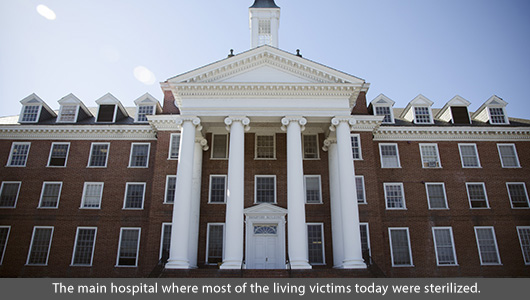
According to Bold it was this compelling reenactment that moved him to conduct even more research and become an advocate for justice to those living victims affected by sterilization. “The Virginia Eugenical Sterilization Act of 1924 is arguably the most shameful law in Virginia’s history. This was an explicit government act by liberal legislators, which openly sought to kill off ‘defective’ and ‘socially inadequate’ citizens from Virginia in an effort to racially purify the human race,” said Bold. “It was not about sterilization. Sterilization was just a means to the end.”
Through his research, Bold learned that of 33 states that participated in eugenics, no state has ever compensated the victims in any way.
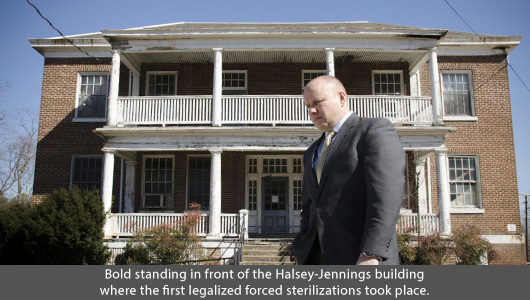
During his second year of law school, leading into the summer of 2012, Bold befriended several victims still residing in Virginia. He became their voice as he launched the Justice for Sterilization Victims Project. This project would be the advocate to encourage legislation to financially compensate said victims. “Time was running out. The only adequate remedy was financial compensation. It is the only way to try to make these living victims whole,” said Bold. He believes financial restitution is about justice, honor, law, politics, jurisdiction, morals and values.
“Money is just the means to achieve these ends. By compensating living victims, we not only stand against this former corrupt legislative act, but we send a message to future legislators to never again march down the road of eugenics,” added Bold.
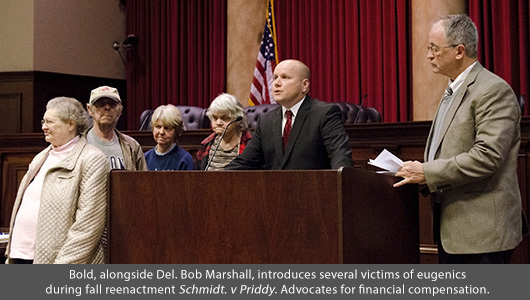
In the early stages of his efforts, Bold spent countless hours traveling back and forth to North Carolina and eventually speaking before the Senate. Prior to his involvement, North Carolina was the first state to seriously consider compensation for the affected victims. Governor Beverly Perdue even signed an executive order establishing a task force to determine the number of victims and how much should be compensated. The Senate later rejected the bill brought forth by the House.
Delegate Patrick Hope (D-Arlington) contacted Bold after noticing his efforts within the state. Sharing the same passion, Hope supported the Virginia Bill, HB 1529, which Bold wrote and introduced. For bipartisan support, Delegate Bob Marshall (R-Manassas) was contacted and shortly became the chief patron of the bill. The remedy, according to HB 1529, was to direct $1 million dollars to come from the surplus budget and be distributed to sterilized living individuals.
In addition to his efforts in North Carolina and Virginia, Bold also challenged West Virginia legislators to repeal their forced sterilization law, the last eugenics forced sterilization law on the books in America. West Virginia now has a bill to repeal this law — HB 2463 and SB 193.
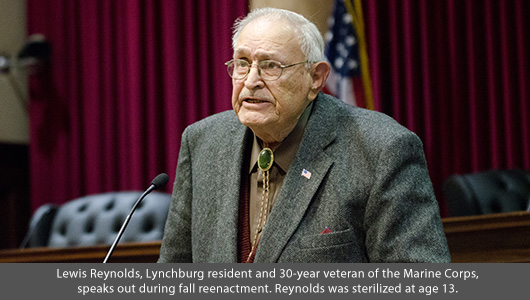
“I believe that all individuals are endowed by their Creator and have intrinsic value, and we are consistent in this message when we demand the government to compensate living victims for what their egregious law took away. Eugenics is completely outside their authority,” adds Bold.
As of today, the majority of Republican legislators voted to “pass by” the bill and not provide a remedy. Bold expressed his confidence that legislation will be done. “While we wait, the few remaining survivors are dying off. Sadly, no one has ever reached out to these eugenics victims. They need to be loved and shown that Christ cares for them, and He loves them, and they have incredible value, and they were made in the image of God,” said Bold.
Referencing Liberty University School of Law in his efforts, Bold adds, “The instruction I received at Liberty more than equipped me with the tools and confidence needed to take up this task. My message to others is, don’t wait until graduation or for someone else to start an initiative. God is ready to use you now. I am eternally grateful for His wisdom in my life, and equally grateful to be a Liberty University School of Law graduate.”
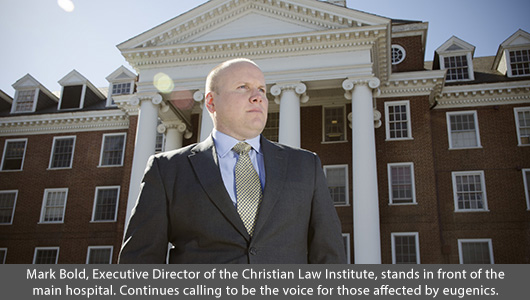
“At Liberty, we teach the law to be used as a fulcrum for good. Mark Bold is such an example when knowledge of the law is exercised into wisdom,” concluded Mat Staver, dean of Liberty University School of Law.
Photo gallery below of reenactment Schmidt v. Priddy, held Fall 2012.
Story and photos by Christopher Breedlove.